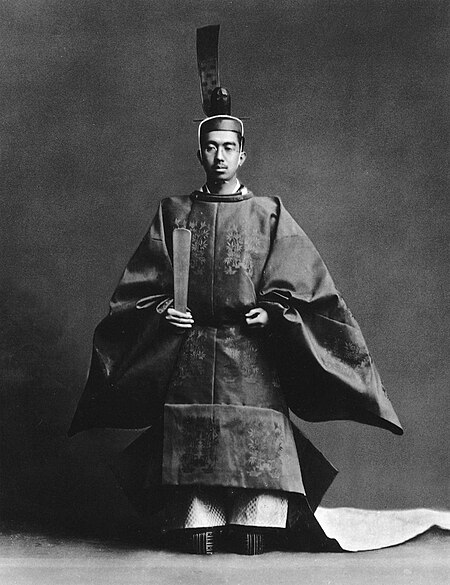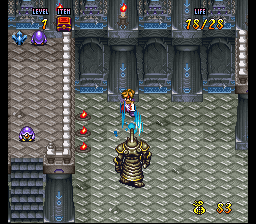Names of Easter
|
Read other articles:

Cet article est une ébauche concernant la politique. Vous pouvez partager vos connaissances en l’améliorant (comment ?) selon les recommandations des projets correspondants. Le concept est employé par Maajid Nawaz pour décrire une partie de la gauche qui ne s'oppose pas aux régressions de certains groupes culturels. La gauche régressive est une épithète utilisée pour décrire une partie de la gauche politique accusée de tenir une position contradictoire en tolérant ou en faisan…

Dream Shizuka (lahir 6 Maret 1988)[1] adalah seorang penyanyi dan penari pop Jepang. Ia adalah amntan anggota grup vokal perempuan Dream dan E-girls. Ia sekarang aktif sebagai anggota DANCE EARTH PARTY. Saat pertama kali bergabung dengan grup tersebut, pada 7 Juli 2002,[2][3] ia menjadi vokalis pendukung dan penari latar. Kemudian, ia belajar dansa dengan anggota segrupnya Erie, dan kemudian, ia makin dikenal karena kemampuan dansanya. Sejak kelahiran kembali Dram pada 20…

У этого термина существуют и другие значения, см. Европа (значения). Европа Спутник Изображение Европы в естественных цветах, снятое JunoCam КА «Юнона» Другие названия Юпитер II Открытие[1] Первооткрыватель Галилео Галилей Место открытия Падуанский университет, Италия Д…
周處除三害The Pig, The Snake and The Pigeon正式版海報基本资料导演黃精甫监制李烈黃江豐動作指導洪昰顥编剧黃精甫主演阮經天袁富華陳以文王淨李李仁謝瓊煖配乐盧律銘林孝親林思妤保卜摄影王金城剪辑黃精甫林雍益制片商一種態度電影股份有限公司片长134分鐘产地 臺灣语言國語粵語台語上映及发行上映日期 2023年10月6日 (2023-10-06)(台灣) 2023年11月2日 (2023-11-02)(香港、…

Danish footballer (born 2001) Morten Frendrup Frendrup with Brøndby in 2021Personal informationFull name Morten Wetche Frendrup[1]Date of birth (2001-04-07) 7 April 2001 (age 23)Place of birth Tuse, DenmarkHeight 1.75 m (5 ft 9 in)[2]Position(s) Defensive midfielder, full-backTeam informationCurrent team GenoaNumber 32Youth career Tuse IF2013–2014 Holbæk B&I2013–2018 BrøndbySenior career*Years Team Apps (Gls)2017–2021 Brøndby 78 (2)2022– Genoa …

International governing body of flying disc sports World Flying Disc FederationSportFlying disc sportsCategoryUltimate, Beach Ultimate, Disc Golf, Guts, Double Disc Court, FreestyleJurisdictionInternationalAbbreviationWFDFFounded1985 (1985)Official websitewfdf.sport The World Flying Disc Federation (WFDF) is the international governing body for flying disc (Frisbee) sports, with responsibility for sanctioning world championship events, establishing uniform rules, setting of standards for an…

The topic of this article may not meet Wikipedia's notability guideline for books. Please help to demonstrate the notability of the topic by citing reliable secondary sources that are independent of the topic and provide significant coverage of it beyond a mere trivial mention. If notability cannot be shown, the article is likely to be merged, redirected, or deleted.Find sources: Ordered to Die – news · newspapers · books · scholar · JSTOR (January 2023) …

Cet article est une ébauche concernant le sport automobile et l’Afrique. Vous pouvez partager vos connaissances en l’améliorant (comment ?) selon les recommandations des projets correspondants. Le Rallye Alger-Le Cap (ou Raid Méditerranée-Le Cap) était une compétition automobile de rallye organisée par Les Amis du Sahara et de l’Eurafrique avec le concours de divers Automobiles Clubs africains dont l’Association sportive de l’automobile club d’Alger, sous le contrôle apr…

此条目序言章节没有充分总结全文内容要点。 (2019年3月21日)请考虑扩充序言,清晰概述条目所有重點。请在条目的讨论页讨论此问题。 哈萨克斯坦總統哈薩克總統旗現任Қасым-Жомарт Кемелұлы Тоқаев卡瑟姆若马尔特·托卡耶夫自2019年3月20日在任任期7年首任努尔苏丹·纳扎尔巴耶夫设立1990年4月24日(哈薩克蘇維埃社會主義共和國總統) 哈萨克斯坦 哈萨克斯坦政府與�…

Welsh antiquarian forger and poet (1747–1826) Morganwg redirects here. For old Welsh kingdom of Morgannwg, see Glywysing. Iolo MorganwgDrawing of Iolo Morganwg (c. 1800) by an unknown artist, in the National Library of WalesBornEdward Williams10 March 1747Pen-onn, Vale of Glamorgan, WalesDied18 December 1826(1826-12-18) (aged 79)OccupationStonemason, poet and collectorLanguageWelshNationalityWelsh Edward Williams, better known by his bardic name Iolo Morganwg ([ˈjɔlɔ mɔrˈɡanʊɡ…

School district in Pennsylvania Hempfield School DistrictLocationPA United StatesDistrict informationTypeSchoolStudents and staffStudents6800+Teachers500+Other informationWebsiteHempfield School District Hempfield School District is a school district of 6800+ students educated in 10 schools by 500+ teachers in Lancaster County, Pennsylvania.[1] It is a member of Lancaster-Lebanon Intermediate Unit (IU) 13. References ^ Hempfield School District statistics External links Official website …

1995 video gameTerranigmaAustralian box artDeveloper(s)QuintetPublisher(s)JP: EnixPAL: NintendoDirector(s)Tomoyoshi MiyazakiProducer(s)Masaya HashimotoShinji FutamiJun TodaDesigner(s)Tomoyoshi MiyazakiArtist(s)Kamui FujiwaraWriter(s)Tomoyoshi MiyazakiReiko TakebayashiComposer(s)Miyoko TakaokaMasanori HikichiPlatform(s)Super Nintendo Entertainment SystemReleaseJP: October 20, 1995PAL: December 19, 1996Genre(s)Action role-playing gameMode(s)Single-player Terranigma[a] is a 1995 action role…

Opera Eight Songs for a Mad KingMonodrama by Peter Maxwell DaviesLeigh Melrose performing the work at the Nordland Music Festival in Bodø, 2014LibrettistRandolph StowBased onwords by George IIIPremiere22 April 1969 (1969-04-22)London Eight Songs for a Mad King is a monodrama by Sir Peter Maxwell Davies with a libretto by Randolph Stow, based on words of George III. The work was written for the South-African actor Roy Hart and the composer's ensemble, the Pierrot Players. It was p…

سان فرانسيسكو كرونيكلSan Francisco Chronicle (بالإنجليزية) الشعارمعلومات عامةالنوع يوميةتصدر كل 1 يوم بلد المنشأ الولايات المتحدة[1][2][3] التأسيس 1865 القطع القطع الكبير الثمن USD 0,75 يومي السبت والاثنين ، USD 1,50 الأحدموقع الويب sfchronicle.com (الإنجليزية) شخصيات هامةالمالك شركة هي�…

Type of wedding procession in Indian subcontinent For the settlement in Mongolia, see Baraat, Töv. For other uses, see Barat (disambiguation). Baraat (Hindi: बरात, Urdu: بارات) (pronunciationⓘ) or Varayatra (Sanskrit: वरयात्रा, romanized: Varayātrā)[1][2] is a groom's wedding procession in Indian subcontinent.[3][4] In Indian subcontinent, it is customary for the bridegroom to travel to the wedding venue (often the bride's ho…

Need and process for obtaining subject approval prior to treatment or research This article is about consent to medical or research procedures. For consent in other contexts, see Consent. For the House episode, see Informed Consent (House).Part of a series onMedical ethics Values Primum non nocere Informed consent Beneficence Confidentiality Autonomy Conflicts Capacity Involuntary treatment Duty to warn Duty to protect Cases Frameworks Advance healthcare directive Surrogate decision-maker Relate…

American bolt-action main battle rifle M1903 Springfield TypeBolt-action riflePlace of originUnited StatesService historyIn service1903–1936 (as the standard U.S. service rifle)1936–1970s (as a U.S. Army sniper rifle)[1]Used bySee UsersWarsPhilippine–American WarBanana WarsMexican RevolutionWorld War ISiberian InterventionIrish War of IndependenceIrish Civil WarCoto WarWorld War IIEgyptian revolution of 1952Greek Civil WarFirst Indochina WarChinese Civil WarIndo…

US Air Force unit 2nd Bombardment Wing redirects here. For the 2nd Bombardment Wing of 1919–1945, see 2nd Bombardment Wing (World War II). This article needs to be updated. Please help update this article to reflect recent events or newly available information. (November 2022) 2nd Bomb WingBoeing B-52H bomber at Barksdale Air Force BaseFounded15 October 1947Country United StatesBranch United States Air ForceRoleBomberPart ofAir Force Global Strike CommandEighth Air ForceGarrison…

«… non mi sono proposto di rendere il mio lettore un profondo erudito, ma un uomo colto. Come chi deve fare un lungo viaggio con un compagno, cui voglia mostrare le vedute, le campagne, i villaggi laterali al cammino, indica, dà notizie, dimostra in breve ciò ch'è degno d'attenzione, e prosegue la sua strada senza fermarsi su due piedi ad ogni momento ed opprimere il suo compagno lettore con lunghe disquisizioni e con minute osservazioni su tutti gli aspetti, e le vedute ed i rottami e le …

Letnan Jenderal TNI (Purn.)Dading Kalbuadi Inspektur Jenderal Departemen Pertahanan dan Keamanan (HANKAM)Masa jabatan27 Januari 1987 – 24 April 1993PendahuluSarwono Widyo HoetomoPenggantiI Putu Sukreta SurantaKepala Staf Umum ABRI ke-3Masa jabatan18 April 1986 – 5 Januari 1987PendahuluMarsekal Madya TNI OetomoPenggantiLetnan Jenderal TNI Ida Bagus SudjanaKodam Udayana ke-8Masa jabatan14 Oktober 1978 – 14 Februari 1983PendahuluBrigjen TNI SoewenoPenggantiB…

